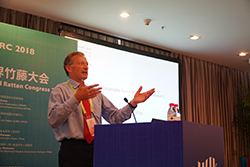Tropical timber, bamboo and rattan could help bridge supply gap for environmentally friendly materials
20 July 2018

ITTO Executive Director, Gerhard Dieterle speaking the parallel session on sustainable tropical forest management co-organized by ITTO at BARC2018. Photo: R. Carrillo/ITTO
Participants in the Global Bamboo Congress 2018 (BARC2018) held late last month agreed that the tropical timber and bamboo and rattan sectors need to work together to meet the increasing demand for forest products due to population growth, close the supply gap for sustainable building materials, and conserve tropical forests. There was consensus that tropical timber, bamboo and rattan co-exist and complement each other as commodities, and the ecosystems of which they are part play important roles in climate-change mitigation and adaptation.
As an important first step towards greater interaction between the sectors, ITTO and the International Network for Bamboo and Rattan (INBAR) signed a memorandum of understanding (MOU) during BARC2018 to strengthen cooperation between the two organizations.
The MOU provides a framework for the implementation of joint activities and projects aimed at the conservation, sustainable management, use and trade of tropical bamboo and rattan in countries that are members of both organizations. The work will include the dissemination of best practices on the sustainable management of tropical forests, bamboo and rattan; the promotion of green supply chains and markets for tropical forest products, including bamboo and rattan; the collection, analysis and dissemination of data on the trade of bamboo and rattan; and outreach efforts to make the case for sustainably produced tropical timber, bamboo and rattan.
Also at BARC2018, ITTO Executive Director Gerhard Dieterle participated in a high-level dialogue on bamboo and rattan for climate change and green growth. During the dialogue he stressed that the development of the tropical forest and bamboo and rattan sectors needs to be cohesive and go hand-in-hand to meet the increasing demand for sustainable and environmentally friendly building materials while ensuring that the ecosystems that support them are conserved. Other speakers at the dialogue were Patricia Appiagyei, Vice-Minister for Environment, Science, Technology and Innovation, Ghana; Saibal Dasgupta from the Ministry of Environment, Forestry and Climate Change, India; Meng Han from the UN Environment Programme–World Conservation Monitoring Centre; Pradeep Monga from the UN Convention to Combat Desertification Secretariat; and Wang Chunfeng from the China National Forestry and Grassland Administration.
ITTO co-organized a parallel session at BARC2018 on sustainable tropical forest management. Participants agreed on the need to use sustainable forest management as a tool to reverse degradation by taking a holistic approach that includes the production of timber and non-timber forest products—including bamboo and rattan—to maximize land-use value. Participants also heard presentations on the cost of certification schemes; bamboo plantation management; and the results of an ITTO-funded project in Indonesia, which has assisted in the development of a community-based bamboo industry. The session was facilitated by ITTO and featured speakers from the Center for International Forestry Research, EcoPlanet Bamboo, Indonesia’s Ministry of Environment and Forestry, and Tropenbos International.
ITTO also co-organized a parallel session on trade policy facilitation for bamboo and rattan, based on its track record and experience in the diversification of trade for tropical timber and timber products. Participants reviewed the latest trends in international trade and market access for forest products (timber and non-timber); discussed the possibility of developing Harmonized System codes for bamboo and rattan and the advantages of this in terms of trade statistics; and received an overview of international markets for bamboo and rattan. Participants listened to a case study from IKEA on trade legislation for bamboo and rattan and the challenges that still exist in exercising due diligence. Finally, participants learnt of a recent initiative led by the Chinese private and public sectors, to be facilitated by ITTO, on the establishment of a global green supply-chain platform to help create a level playing field for good businesses and close emerging supply gaps for tropical forest products while conserving biodiversity, mitigating climate change and ensuring environmental health. Speakers at the session were from the Center for International Forest Products Trade of the National Forestry and Grassland Administration of China, the China Customs Administration, IKEA, INBAR, ITTO and the World Customs Organization.
Download the presentations from the session on trade policy facilitation for bamboo and rattan.
Follow social media postings of the conference on Facebook, Instagram and Twitter.